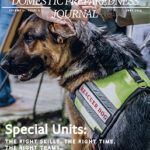DomPrep’s John F. Morton met with Thomas J. Lockwood, Director, Office of National Capital Region (NCR) Coordination, Department of Homeland Security (DHS) to discuss Lockwood’s views on the need to work in close coordination with the Washington, D.C., Council of Governments, the prioritization of all-hazards security plans, integrated training requirements, & the special roles played by regional CIOs & CTOs.
Background on NCR Coordination
The background, composition, and coordination of the NCR. Working through the Washington Council of Governments (COG). Leveraging coordination through existing bodies to prioritize all–hazards/homeland-security focus and investments.
Impact on the NCR
Regional assessment of the NCR via the Emergency Management Accreditation Program (EMAP); the challenges to development and implementation of the NCR Homeland Security Strategic Plan; coordinating an NCR awareness campaign on the need for personal-preparedness plans.
Operational Impacts
Prioritizing information sharing for CBRNE prevention/mitigation and response/recovery – e.g., provision of regional radio caches and common tool sets. The role of regional CIOs and CTOs in providing an architectural framework for tactical integration. Integrated training. How the NCR brings the appropriate players to the table to set regional requirements, write budget lines, and develop grant funding plans.
Application to Other Regions in the Country
The importance of knowing the regional players to prioritize, plan, and leverage interstate information fusion. The example of the “Quad State” Initiative created by Virginia, West Virginia, Maryland, and Pennsylvania.
NCR Coordination and First Responder Authentication
The need for first-responder authentication. The Federal Information Processing Standard (FIPS) 201 as a “trust model” for an open-architectureentity-management standard. The U.S. Fire Administrator’s case for consistent terminology based on emergency support function (ESF) to facilitate authentication. Use of first-responder authentication cards for after-action reports and assessments, and as a performance measure for future NCR exercises.

Thomas J. Lockwood
Thomas J. Lockwood has been Senior Advisor for Credentialing Interoperability in the Department of Homeland Security's Screening Coordination Office since April 2007 and is a member of the department's senior leadership team. Previously, he was the director of the Office of National Capital Region Coordination (ONCRC). Prior to his DHS service, he was the homeland security advisor and deputy director of Maryland's Office for Homeland Security, where he served on several executive boards including the U.S. Attorney Maryland District's Anti-Terrorism Task Force, the Department of Homeland Security's National Capital Region Senior Policy Group, the Maryland Maritime Security Group, the Maryland Terrorism Forum, the Washington Council of Government's National Capital Region Emergency Preparedness Council, and the National Emergency Management Association's Homeland Security Committee.
- Thomas J. Lockwoodhttps://domesticpreparedness.com/author/thomas-j-lockwood
- Thomas J. Lockwoodhttps://domesticpreparedness.com/author/thomas-j-lockwood
- Thomas J. Lockwoodhttps://domesticpreparedness.com/author/thomas-j-lockwood
- Thomas J. Lockwoodhttps://domesticpreparedness.com/author/thomas-j-lockwood








